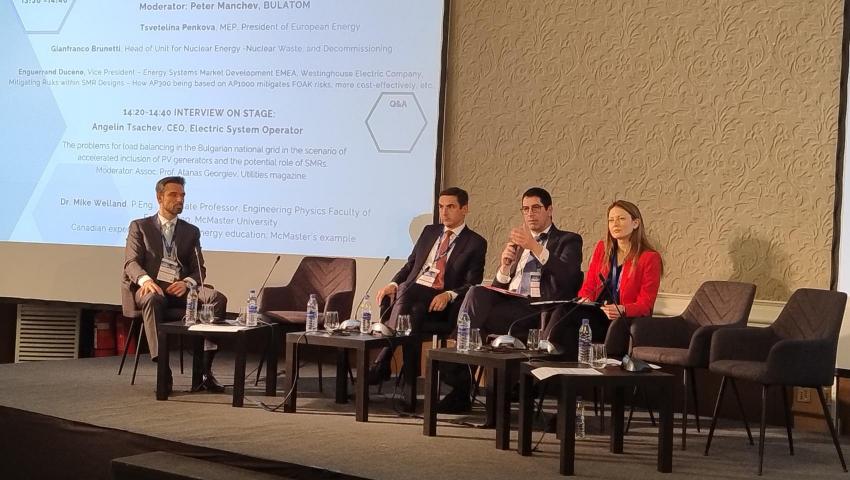Experts: Whether a large NPP or SMR is being built, safety is the most important

Small modular reactors (SMRs) are the next step ahead for Bulgaria and the Ministry of Energy encourages all attempts and investments in personnel and technology in the study and introduction of this energy source into our network. This was stated by Deputy Minister of Energy Georgi Samandov at an international conference in Sofia, organized by the Bulgarian Energy and Mining Forum (BEMF) and the Canadian Chamber of Commerce in Bulgaria. He referred to Bulgaria's experience in the operation of nuclear power plants. Based on this, he indicated that our country could be a pivot in Europe for the introduction of SMRs into the energy mix.
The President of the Canadian Chamber of Commerce in Bulgaria, Alex Nestor, for his part, reminded that the renaissance of nuclear energy in Europe is at its very beginning. He drew attention to the recent delays in major nuclear projects and the overruns of budgets for their implementation. According to him, there are a number of reasons why the management of such projects suffers - from design flaws and regulatory obstacles to financing, and he expressed his expectation that the forum will provide an opportunity to discuss and overcome these obstacles.
It is a myth that nuclear energy can rely only on the budgets of national governments, said MEP Tsvetelina Penkova, drawing attention to the need for additional investments in nuclear energy. According to her, small modular reactors are a new technology that is more flexible, has the potential for smaller investments, lower costs, and can be developed and deployed in remote areas. However, let us not forget that small modular reactors are not yet a commercial reality, there are no operating ones yet, said Penkova. According to her, discussions on the topic are often held in the European Parliament and SMRs are perceived more as a complementary technology, rather than as a replacement for large nuclear power plants.
Penkova reminded that there is still no regulatory framework for the MMR, and when one is prepared, it will have to have the highest possible safety and security standards, as introduced for other reactors, she said.
Her opinion was also supported by Gianfranco Brunetti, Head of the Nuclear Energy Unit at the EC. The strategic goals of the economy in the current context require the development of these advanced technologies. Let's not forget the competitiveness of different types of energy sources, and the EC plan should also include elements for the development of new technologies, so that member states also think about investing in the nuclear sector, Brunetti said.
The EC has already acknowledged that in order to achieve the 2050 goals, energy consumption will grow very rapidly and to meet it, large amounts of energy will be needed, which are expected to come mostly from renewable energy sources, but this will not be enough, Brunetti added. According to him, in the future, SMRs will be included in integrated energy systems in order to help achieve low-carbon emissions and environmental protection goals. The plans for small modular reactors also take into account the development of large plants and the combination of the two types of energy sources, Brunetti pointed out. Later in the discussion, he drew attention to the 9 selected projects that are being discussed. At the same time, he drew attention to the challenges regarding the regulatory framework - the difference in the work of the individual regulators of the 27 member states, the search for common ground for synchronization. There are also cultural differences, but the goal is one - security and safety, he said. Moreover, Brunetti pointed out that the program that the EC is currently advocating is consistent with the mandate of the pact and is considering the construction of large nuclear power plants, the possibility of extending the life of existing nuclear reactors. He was categorical about the need for investments and personnel.
The opinion that MMRs are not a replacement for large nuclear power plants will be joined by Angheran Dussen, vice president at Westinghouse, responsible for the energy systems market and development. In particular, he emphasized that regardless of whether an MMR or a large nuclear power plant is being built, safety and security are the most important. At Westinghouse, we work with proven AP1000 technology, we would not want to use something that has not been proven, we want to use tradition for the benefit of the large-scale user, Dussen pointed out. He explained that in small modular reactors, the company adapts the AP1000 with minimal changes to something that is very similar, but on a smaller scale. The benefit of such a design is that experience is on our side, but we must be careful and be able to work faster and the costs are lower, he added. After all, the most important thing is safety.
